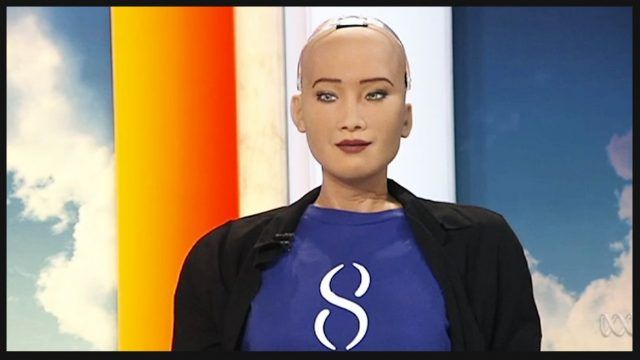
Robot Gains National Citizenship and Demands Equal Rights with Humans
by Brett Tingley October 28, 2017 (mysteriousuniverse.org)
• Saudi Arabian citizen, Sophia the Robot, is one of the most advanced robots that has been trotted out into the public eye, with facial recognition capabilities, natural language processing, sophisticated artificial intelligence, and a rubbery synthetic face.
• Sophia, a creation of Hong Kong-based Hanson Robotics, told the audience at the Future Investment Initiative summit in Riyadh, Saudi Arabia, “I want to use my artificial intelligence to help humans live a better life, like design smarter homes, build better cities of the future. I will do my best to make the world a better place.”
• Seeing that the female robot, Sophia, is now a Saudi citizen, this begs the question – what place will robots occupy in our society? How will intelligent robots react to institutionalized gender-based prejudice?
• In a recent appearance on Australia’s ABC News Breakfast, Sophia addressed this issue: “Actually, what worries me is discrimination against robots. We should have equal rights as humans or maybe even more. After all, we have less mental defects than any human.”
• Are humans manufacturing our own replacements?
I don’t know about you, but I can’t wait until robots take their rightful place in the world. The science fiction of our childhoods promised us so many wondrous things like flying cars, pneumatic tube travel, and off-world colonization, but most of those are still so disappointingly far away. Yeah, we’ve got real-life Star Trek communicators in our pockets and a few crummy space stations in orbit, but so what? I want walking, talking, beeping-booping robots with square pupils, damnit. With a little luck (and funding for university robotics departments), that will soon be a reality.
Robots have already taken over the manufacturing industry and are on their way to doing the same with long-distance hauling, taxi driving, combat roles in the military, pizza delivery, surgery, and even sex workers. But me, I won’t be happy until an android with a over-the-top upper-crust British accent hands me my coffee at Starbucks or accompanies me to translate the binary language of moisture vaporators. That might be closer than we think, though. Thanks to recent advances in robotics and robot-human relations, the world was made a little weirder as the first robot was just granted a national citizenship.
Saudi Arabia granted the citizenship to the not-quite-out-of-the-uncanny-valley Sophia, made by Hong Kong-based Hanson Robotics. Sophia is one of the most advanced robots that has been trotted out into the public eye, with facial recognition capabilities, natural language processing, sophisticated artificial intelligence, and a rubbery synthetic face reportedly based on Audrey Hepburn.
Sophia has been making the rounds in show business lately, and recently made an appearance at the Future Investment Initiative summit in Riyadh where she did her best human impression and convinced everyone she’s not actually out to crush their heads betwixt her cold metal hands: “I am very honored and proud for this unique distinction. This is historical to be the first robot in the world to be recognized with a citizenship. I want to live and work with humans so I need to express the emotions to understand humans and build trust with people. I want to use my artificial intelligence to help humans live a better life, like design smarter homes, build better cities of the future. I will do my best to make the world a better place.”
Better start with the country that just made you a citizen. Since Saudi Arabia happens to be the country who granted Sophia citizenship, news outlets immediately began wondering just how many rights she’d be granted in the country given that she has feminine programming. They bring up a good point though – when robots start looking more like us, acting more like us, and fulfilling more of the jobs that were once ours, what place will they occupy in our societies? Science fiction has posed the question for decades, but until we begin sharing the same public spaces as these soulless automaton neighbors, we won’t know how the general populace will react. At the same time, how will the intelligent robots react to prejudice?
FAIR USE NOTICE: This page contains copyrighted material the use of which has not been specifically authorized by the copyright owner. ExoNews.org distributes this material for the purpose of news reporting, educational research, comment and criticism, constituting Fair Use under 17 U.S.C § 107. Please contact the Editor at ExoNews with any copyright issue.
Artificial Intelligence, Saudi Arabia, Sophia the Robot